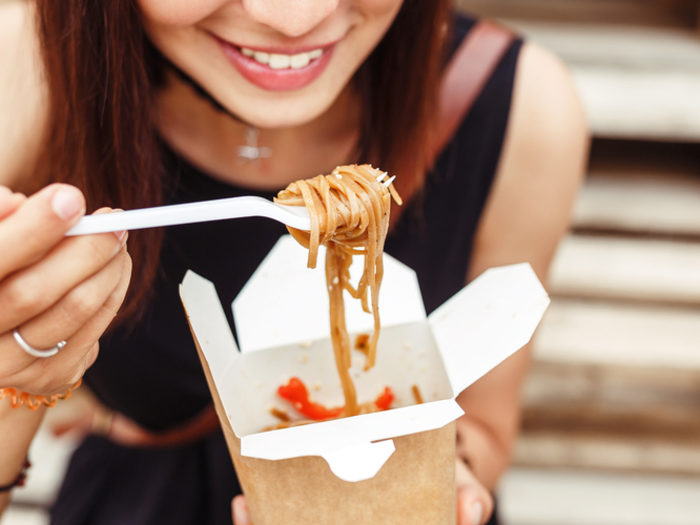
I decided to do my daily fast from about 8 p.m. until noon the next day. This meant all of my eating for the day occurred between 12 p.m. and 8 p.m. At first, I woke up starving.
I discovered that eating a high-protein snack around 8 p.m., like egg whites or cheese, prevented the hunger pangs that came the following morning, making it significantly easier to fast until noon.

Although I (luckily) didn't have a migraine during the experiment, I did get a handful of dull headaches the first few days, particularly toward the end of my fast around 11 a.m. or noon. After three or four days, my body adjusted to the diet and the headaches dissipated.

I don’t eat breakfast and never have, which made this form of intermittent fasting fairly easy for me. The stretch from about 10 a.m. to noon was difficult, but I always made it.
I did drink coffee with creamer every morning upon waking up. (Some experts suggest only drinking black coffee when intermittent fasting, though opinions vary, according to Popsugar.) I can go 16 hours without eating, but I definitely can’t write without my usual morning cup of java.

By far, the most difficult part of intermittent fasting for me was the effect it had on my social life. I had to make dinner plans with friends earlier than I typically would and had to pass on a tempting ice cream run with my husband on a 100-degree night in Dallas.

I have a habit of doing a rough mental count of how many calories I eat each day. I’m not a strict calorie counter, but I always have an idea of how much I’ve eaten, and I try to stay in the 1,600 to 1,800 calorie range. During this experiment, I didn't worry as much as I normally would about going over 1,800 calories, because I was limiting my hours for eating.
One day I definitely ate more than 1,800 calories. But because I knew I had a fast ahead of me, I didn’t feel as guilty about the cheeseburger, sweet potato fries, and Moscow mules I indulged in.

I have GERD and take a daily medication to prevent acid reflux and heartburn. I forgot to take my medication for a couple of days (a regular occurrence) and noticed that my GERD symptoms — which usually strike late at night — weren't as severe.
By giving myself three or four hours before bed to properly digest my food, I avoided the reflux that often accompanies rich dinners or late-night snacking.

I have always avoided specific diets (like the Mediterranean diet or the Atkins diet) because I feared cutting out too many foods. I already eat gluten-free because I have celiac disease, and I didn’t want to give up anything like dairy or meat, too. I enjoyed intermittent fasting because I could still eat everything I wanted to without feeling deprived.

At the end of my 10 days, I lost about two pounds, which was more than I anticipated. I don’t have significant weight loss goals and was primarily looking for a diet that would help me shed a few pounds and then maintain a healthy weight. This diet felt accessible and realistic.
The major downside of the 16/8 method, however, was how prohibitive it was on the weekends. I couldn't grab drinks with friends or splurge on a late-night chocolate Haagen-Dazs bar with my husband. Moving forward, I plan on partaking in the diet Sunday through Thursday and taking a break on Friday and Saturday.
 Exploring the world on wheels: International road trips from India
Exploring the world on wheels: International road trips from India
 10 worst food combinations you must avoid as per ayurveda
10 worst food combinations you must avoid as per ayurveda
 Top seeds that keep you cool all summer
Top seeds that keep you cool all summer

Copyright © 2024. Times Internet Limited. All rights reserved.For reprint rights. Times Syndication Service.